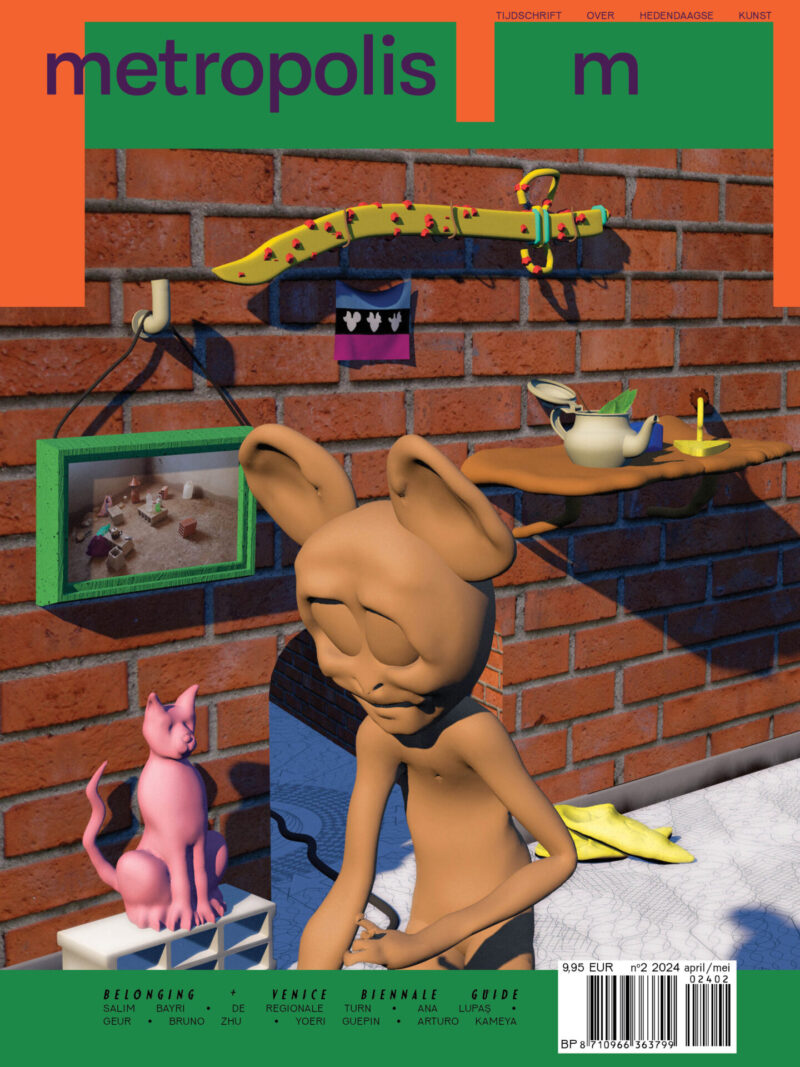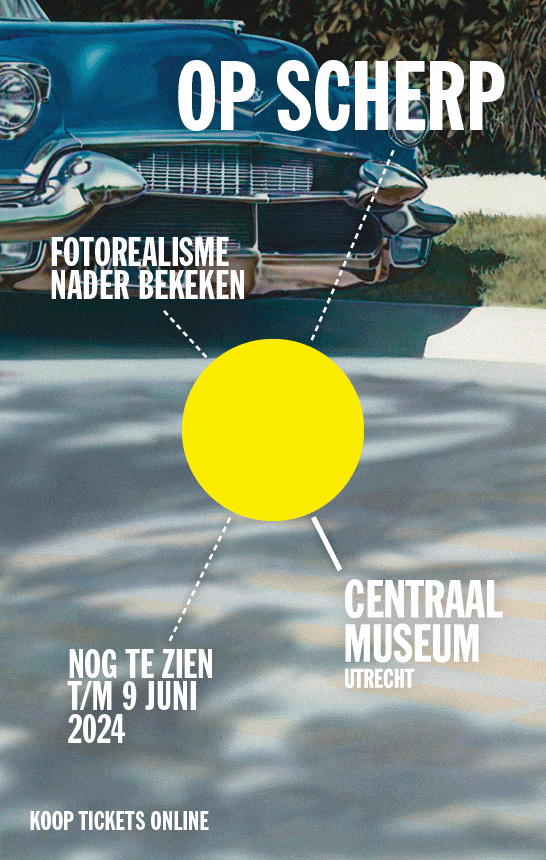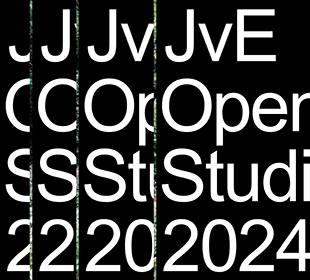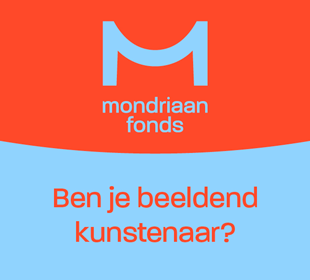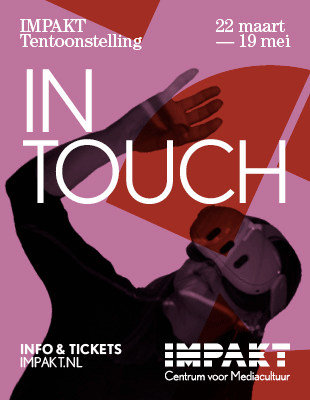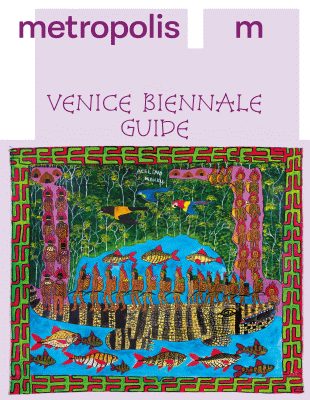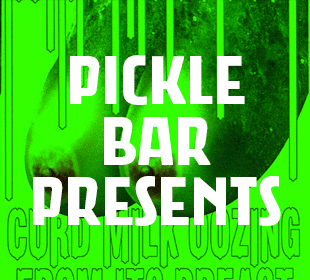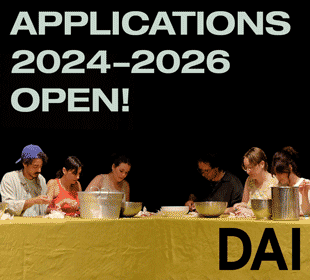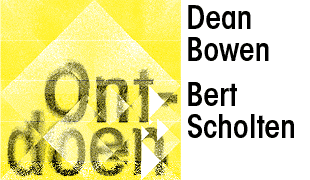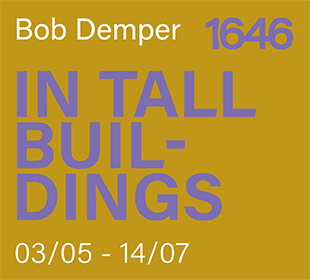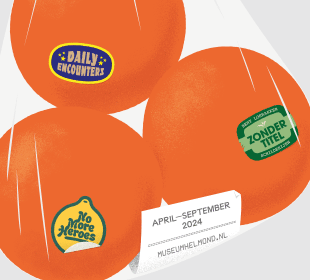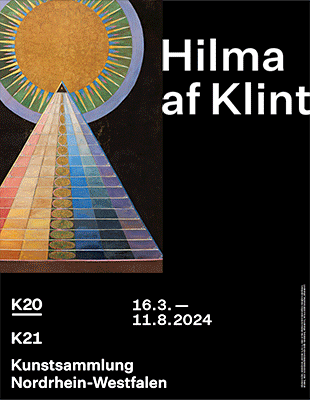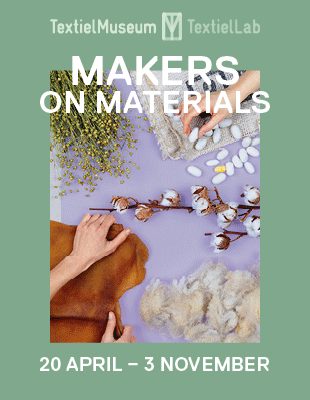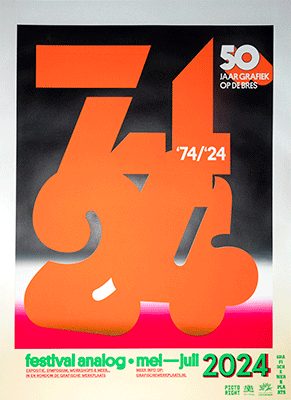
An evening of performances titled If improvisation could serve as a manual, if gesture could serve as a guide Vol. 2, hosted at NGO – Nothing Gets Organised in Johannesburg, South Africa. Curated by the nomadic curators in collaboration with NGO curator Gabi Ngcobo. With invited artists Nyakallo Maleke , Jota Mombaça, and Christian Nyampeta (photographed here). March 2022. Photo: Taff Meda
Talking to Nomaduma Rosa Masilela and Thiago de Paula Souza – Nomadic curators at Vleeshal Middelburg
Ever since curators Nomaduma Rosa Masilela and Thiago de Paula Souza started practicing together, they have been working to unpack Audre Lorde’s question: ‘How do we learn to love each other while we are embattled on so many fronts?’ Danai Giannoglou asks them about Vleeshal’s nomadic program they are currently curating.
Nomaduma Rosa Masilela and Thiago de Paula Souza met on the occasion of the 10th Berlin Biennale, where they were both invited by Gabi Ngcobo to join the curatorial team. During the biennale, Masilela was working on ‘Strange Attractors’, a curatorial publication of artists’ contributions and archival material that included a journal entry written by Lorde in Berlin on June 21, 1984 during her fight against an ultimately life-consuming cancer; this entry was later reprinted in A Burst of Light. Masilela explains: ‘This question of ‘how’ that Lorde poses is incredibly generative. It is open and centers process, rather than conclusion. It deeply resonated with us.’
Their work as the curators of the nomadic program at Vleeshal belongs under the umbrella of a bigger research project they have initiated around Lorde’s query. Their common practice began in 2020 at Tankstation, an artist-run space in Enschede. ‘We were sitting with this question when Sam Samiee invited us to Tankstation. We knew we wanted to do a process- based show, something that would grow over time’, Masilela tells me. Due to the restrictions that were enforced as a result of the pandemic, none of their initial ideas could be realized. They decided to host a series of digital workshops instead, inviting eight individuals of different artistic and poetic backgrounds that they had previously collaborated with, or whom they hoped to work with in the future.
During these workshops, each contributor brought into the conversation practices of artists that they felt close to or admired and wanted to share with the group. In an effort to redistribute the budget of a canceled exhibition during a moment when artists and cultural workers saw their funding possibilities dropping out one after the other, Masilela and de Paula Souza reached out to the artists that were discussed in this hybrid think tank and asked them to invoice them for 100 euros, a modest remuneration for the effort and research that had already gone into the production of their works.

An evening of performances titled If improvisation could serve as a manual, if gesture could serve as a guide Vol. 2, hosted at NGO - Nothing Gets Organised in Johannesburg, South Africa. Curated by the nomadic curators in collaboration with NGO curator Gabi Ngcobo. With invited artists Nyakallo Maleke (on the right), Jota Mombaça (on the left), and Christian Nyampeta. March 2022. Photo: Taff Meda
‘Value doesn’t only lie in what is new’, they explain. ‘We were trying out this curatorial gesture of rehearsing what an institution can be, imagining whether we can organize differently how money circulates.’ This unexpected outcome of the Tank Station project epitomizes the core ideas and methodologies that Masilela and de Paula Souza work with, exploring, expanding and building networks, redistributing and restructuring funds and focusing on processes rather than final objects. In many ways, this is exactly what brings them and Vleeshal together, as it is the aim of the nomadic program to rethink institutional structures and doings, and it was this criticality and openness that resonated with the duo and resulted in their appointment in 2022.
‘For us, being nomadic is not about jumping from one place to the other, landing in scenes or spaces we have no connection with’

An evening of reading and performance titled If improvisation could serve as a manual, if gesture could serve as a guide, hosted at Artists Space in New York, USA. Curated by nomadic curators Nomaduma Rosa Masilela and Thiago de Paula Souza in collaboration with Artists Space curator Danielle A. Jackson. With invited artists Jayce Clayton, Sonia Louise Davis, Prince Grace, Shala Miller, and Jota Mombaça. May 2022. Photo: Filip Wolak

An evening of reading and performance titled If improvisation could serve as a manual, if gesture could serve as a guide, hosted at Artists Space in New York, USA. Curated by nomadic curators Nomaduma Rosa Masilela and Thiago de Paula Souza in collaboration with Artists Space curator Danielle A. Jackson. With invited artists Jayce Clayton, Sonia Louise Davis, Prince Grace, Shala Miller, and Jota Mombaça. May 2022. Photo: Filip Wolak
Even though Masilela and de Paula Souza are the first curators of the nomadic program outside the institution, the program was already established in 2015 as an extension to Vleeshal’s exhibition activities, and to provide space for experimentation beyond their physical institutional structure. The program that Masilela and de Paula Souza are building expands upon this initiative for curatorial, artistic and institutional innovation, and provides a wider range of geographies, keeping at its core the pre-existing relationships and networks of both the curators and Vleeshal.
Initially planned as a one-year operation, Vleeshal’s director Roos Gortzak immediately proposed to extend it to a two-year program, in order to allow time for pause and reflection within this new position. The curators are given the freedom to rehearse possibilities and curatorial methodologies beyond this frame, however they do so in close conversation with Gortzak and Vleeshal’s curatorial assistant Adriënne van der Werf, and with the ongoing support of Vleeshal staff. Through this program, Vleeshal in itself seems to look into what it means to be a non-profit institution in a small city in a remote province. What is the extent of its reach and role? How can it exist and change?
Even solely by looking at the name of the program, one easily understands that the main condition for it is to take place outside the walls of the institution. I am naturally wondering how the curators understand nomadism and how much of an emphasis they give to this aspect: ‘As a duo we are not constantly looking at this word, “nomadic”, or we do so in a critical way. For us, being nomadic is not about jumping from one place to the other, landing in scenes or spaces we have no connection with. This is why it is important for us to have some link or relationship with the places or the people we are working with. Of course we are travelling, but this comes as result of the fact that the people we want to work with are not only living where we are. The difference between what we do and the work of an independent curator is that we have the support of a certain infrastructure and less precarity,” de Paula Souza explained.

Still from Iagor Peres and Gê Viana's collaborative short film, commissioned by the Vleeshal nomadic curators. The work was screened at Pivô Art and Research in São Paulo, Brazil. December 2022. Image: Iagor Peres and Gê Viana
As part of the program, Masilela and de Paula Souza have worked with a number of artists and institutions. Together they were recently hosted by Pivô in Brazil where they presented two collaborative works newly commissioned by the Vleeshal nomadic program from two pairs of Brazilian artists: a short film by Iagor Peres and Gê Vianna, and a video installation by Juliana dos Santos and Davi Pontes. Before that, Masilela participated in Flow, a residency of sorts, organized by Agnieszka Brzeżańska and Ewa Ciepielewska where a group of people float on a boat down the Vistula river from Gdańsk to Warsaw, embracing the rhythm and disconnection of the river and the different states of mind that it allows. For this trip the curators also invited the artistic duo HUNITI GOLDOX (comprised of Areej Huniti and Eliza Goldox), another duo that looks into waterways (this has been one of the few direct connections between the program and the landscape of Middelburg).
Masilela and de Paula Souza presented two collaborative works newly commissioned by the Vleeshal nomadic program from two pairs of Brazilian artists: a short film by Iagor Peres and Gê Vianna, and a video installation by Juliana dos Santos and Davi Pontes

Still from Iagor Peres and Gê Viana's collaborative short film, commissioned by the Vleeshal nomadic curators. The work was screened at Pivô Art and Research in São Paulo, Brazil. December 2022. Image: Iagor Peres and Gê Viana
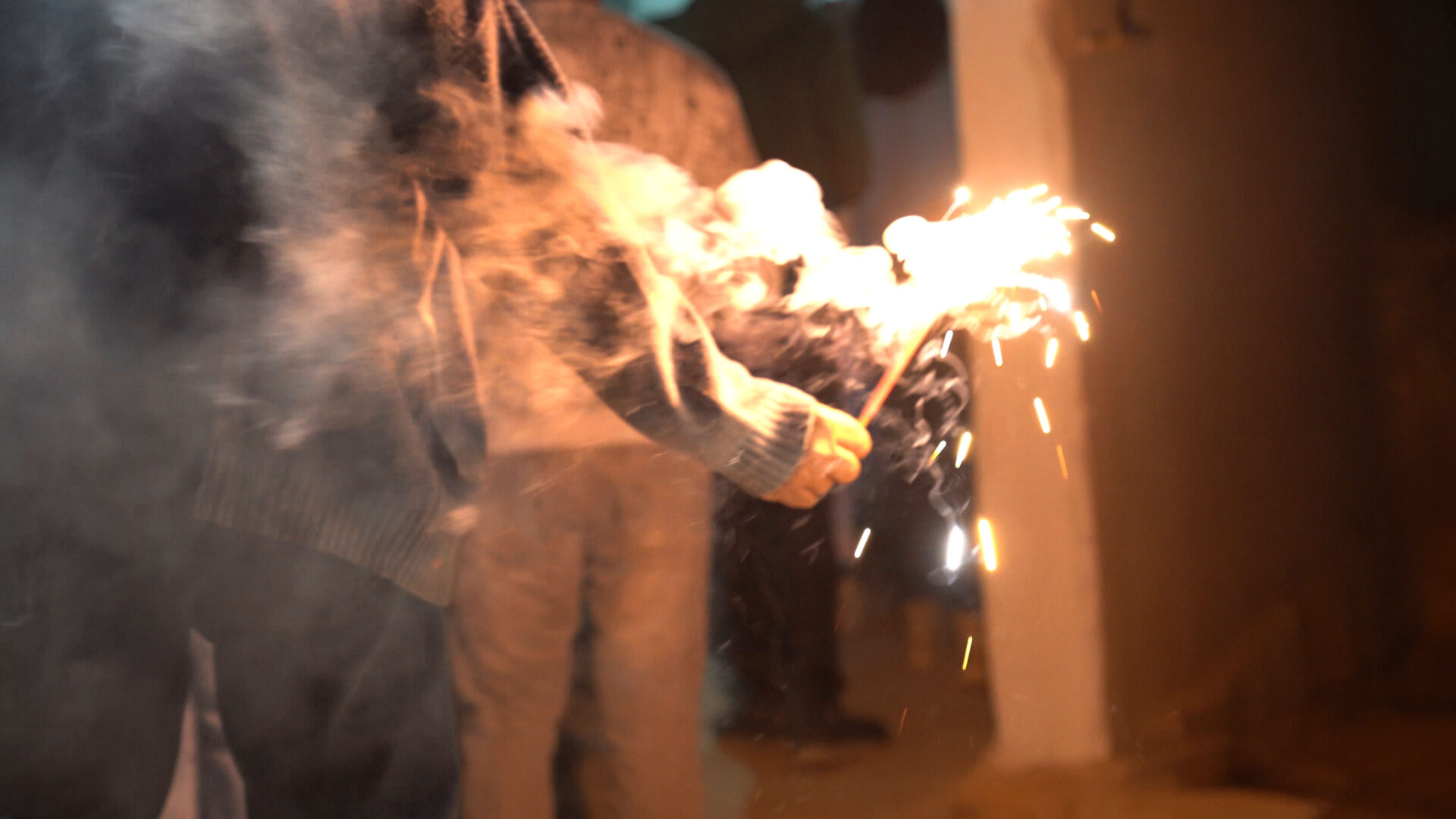
Still from Davi Pontes and Juliana dos Santos' video work, commissioned by the Vleeshal nomadic curators. The work was screened at Pivô Art and Research in São Paulo, Brazil. December 2022. Image: Davi Pontes and Juliana dos Santos
In October they participated in a conversation with Temitayo Ogunbiyi at the Van Abbe museum which was hosting the work of the artist. Ogunbiyi had originally contributed work to the publication Strange Attractors and this event was a chance to keep their conversation going, as well as to expand the project originally sketched out by Ogunbiyi in the publications pages. In July, they organized a screening of ‘Audre Lorde – The Berlin Years 1984 to 1992’, a documentary directed by Dagmar Schultz, at Cinema Middelburg, which was accompanied by readings and a discussion; a month prior the curators arranged with the help of Vleeshal’s management assistant Hanna Verhulst for Berlin-based artists Han Le Han and Houaïda to participate in a residency program in Italy, thus allowing the artists the space to explore their long-enduring desire to work together and explore each other’s practice. All these events are exceptional proofs of an adaptive curatorial method that puts to use existing material- not only artworks, even though this is also an important part of their practice- but also structures, networks and platforms. Despite the general fixation of the art world with novelty, the nomadic program so far is a noteworthy example of working with what is already built, and expanding it through networks and collaborations.
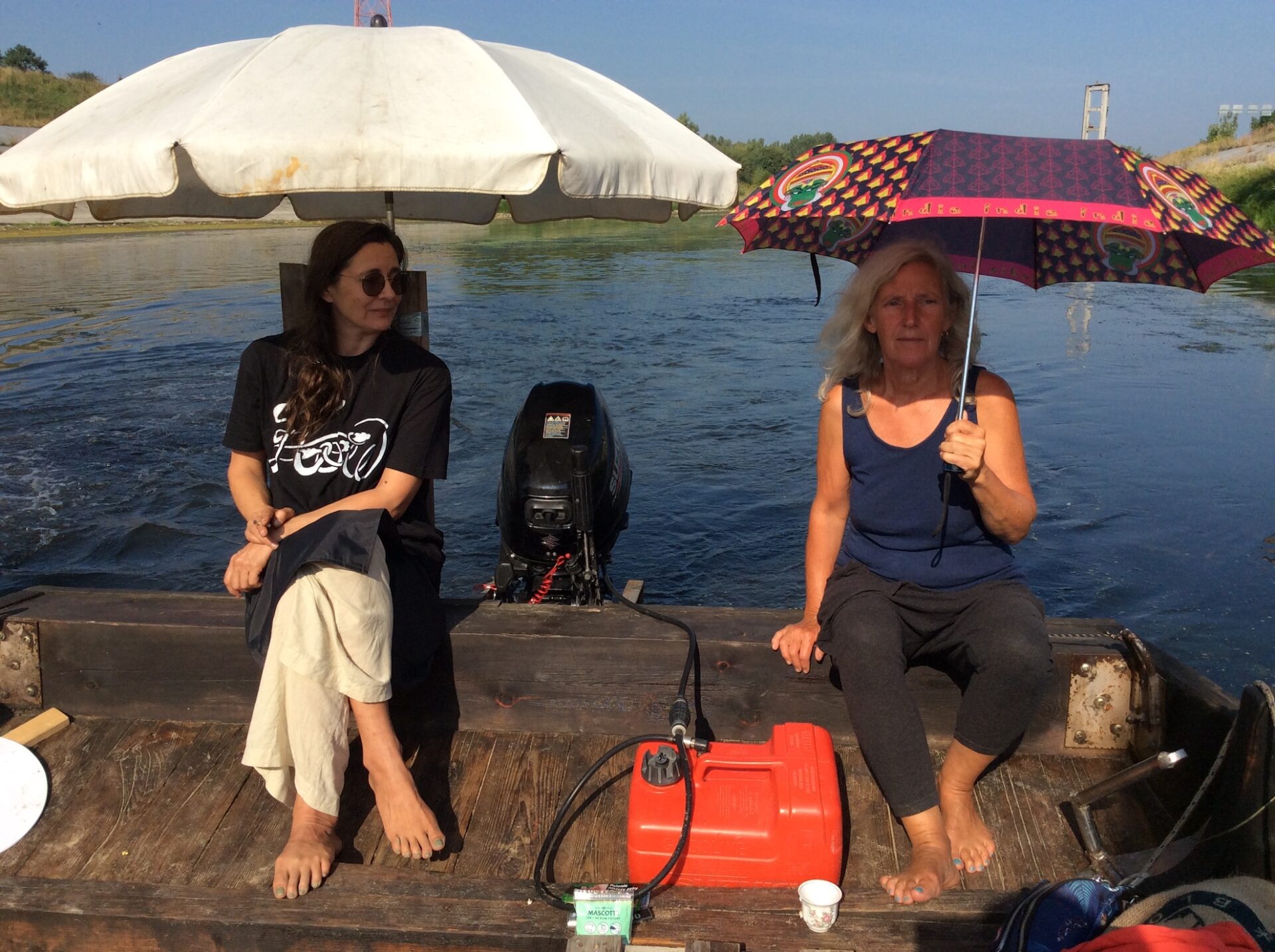
Flow residency founded and organised by Agnieszka Brzezańska and Ewa Ciepielewska (photographed here), is an artist-run artist residency that floats down the Vistula river in Poland. The nomadic curators invited the artistic duo HUNITI GOLDOX (comprised of Eliza Goldox and Areej Huniti, based in Jordan and Germany), whose work focuses on water ways and its politics, to join Brzezańska, Ciepielewska, and Masilela on the water. August 2022. Photo: Nomaduma Masilela
Even though the events have no hierarchy, I distinguish one that keeps coming back into our conversation. The inauguration of the program, that carried the title ‘If improvisation could serve as a manual, if gesture could serve as a guide’, was an evening of performance and conversation at Artists Space in New York in collaboration with its curator Danielle A. Jackson, and with invited artists Jayce Clayton, Sonia Louise Davis, Prince Grace, Shala Miller, and Jota Mombaça. It is not only that improvisation as a term and as a methodology seems to encapsulate the duo’s entire practice, but this event also feels like the beginning of their thinking about the publication which will be produced at the end of the nomadic program.
‘We are making a basket of things without hierarchy, a group of images and works that curatorially speaking will produce a landscape of our work, of what we do’

Flow residency founded and organised by Agnieszka Brzezańska and Ewa Ciepielewska (photographed here), is an artist-run artist residency that floats down the Vistula river in Poland. The nomadic curators invited the artistic duo HUNITI GOLDOX (comprised of Eliza Goldox and Areej Huniti, photographed here and based in Jordan and Germany), whose work focuses on water ways and its politics, to join Brzezańska, Ciepielewska, and Masilela on the water. August 2022. Photo: Nomaduma Masilela

Screening of Dagmar Schultz's documentary Audre Lorde - the Berlin Years 1984 to 1992, at the Middelburg Cinema in Middelburg, the Netherlands. Curated by Nomaduma Rosa Masilela, Thiago de Paula Souza, and Roos Gortzak, the screening featured readings and performances by philosopher Joyce Pinjenburg and writer Anna de Bruyckere. July 2022. Photo: Franz Mueller Schmidt
‘This might be the main nomadic object’, Masilela and de Paula Souza tell me. ‘A publication travels way more than anything else. We don’t want to crystallize what we did, it’s not a catalogue and it is not an anthology. We wanted to make a manual. We are interested in manuals because they attempt to answer this question of “how” that is central in our practice. It is a book form that resonates with us and represents a process. The way of making the book is as important as what ends up in the book. We wanted to do events to help us think about the manual, to start being in conversation with people that could potentially contribute to it and let this be the editorial process.’
From our conversation it is clear that this publication is not intended to be the archive of the project. However, documentation plays an interesting role in the development of the program. Without being sure of what to do with material, they are photographing and filming everything they do. Recently, they decided to create a number of short clips that will join Vleeshal’s small collection of video works from the 70s. Soon a perpetual calendar will be launched, that has been developed with Seoykung Kim, who also designed the graphic identity of their nomadic program in dialogue with Masilela, de Paula Souza, Gortzak, and van der Werf.
Most recently, they organised a second ‘volume’ (as they call it) of “If improvisation could serve as a manual, if gesture could serve as a guide,” at NGO – Nothing Gets Organised, an artist-run project space in Johannesburg, South Africa. Collaborating with Gabi Ngcobo again, they invited the artists Christian Nyampeta, Nyakallo Maleke, and once again Jota Mombaça for another evening of performances and communion. Their final event will take place in November with Temitayo Ogunbiyi, but before that they will travel to Athens for an event at FAC (Feminist Autonomous Centre for Research) together with artist Jota Mombaça whose work has already been included in the nomadic program, and will coordinate another event with the artists of the Flow residency, and of the Italian residency. ‘Generative repetitions’ is what they call these appearances of the same collaborators in more than one event. I feel that this might be the most accurate term to describe their entire practice.
Before we end our conversation, de Paula Souza mentions philosopher Denise Ferreira da Silva, an important reference for their way of thinking about processes: ‘Speaking about black women, Ferreira da Silva says that they each produce different images of the world and that when they come together, this becomes a landscape. We do the same: we are grouping people, conversations, elements and exchanges. We are making a basket of things without hierarchy, a group of images and works that curatorially speaking will produce a landscape of our work, of what we do.’
As can be read in the article: the final event of Nomaduma Rosa Masilela and Thiago de Paula Souza will take place in November with Temitayo Ogunbiyi, but before that they will travel to Athens for an event at FAC (Feminist Autonomous Centre for Research) together with artist Jota Mombaça whose work has already been included in the nomadic program, and will coordinate another event with the artists of the Flow residency, and of the Italian residency.
Danai Giannoglou
is een curator en schrijver, momenteel werkzaam als assistent curator bij De Appel